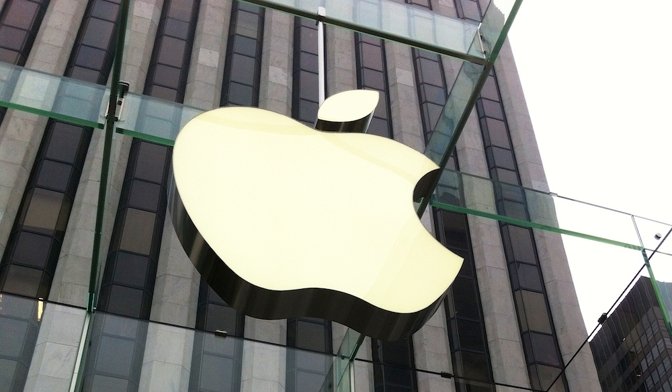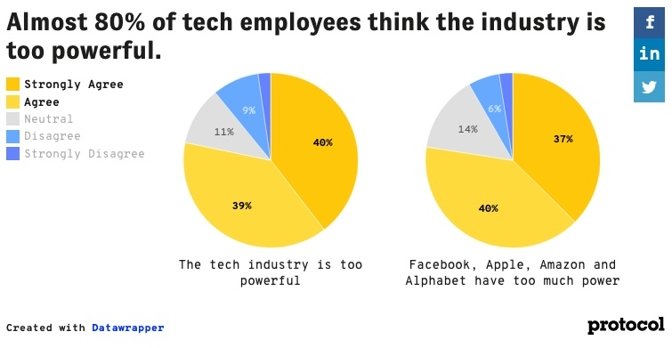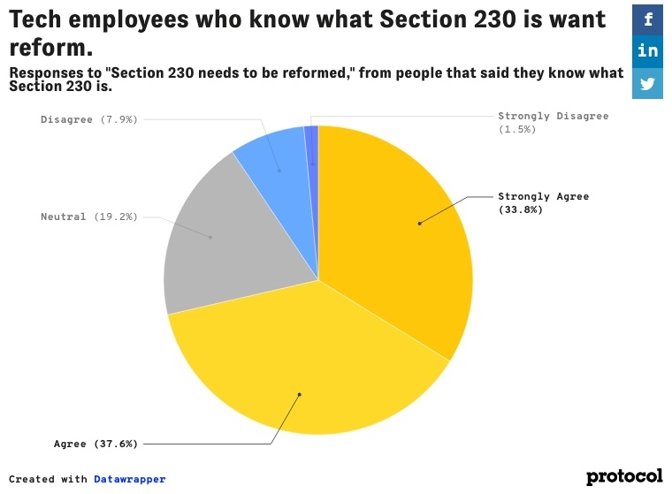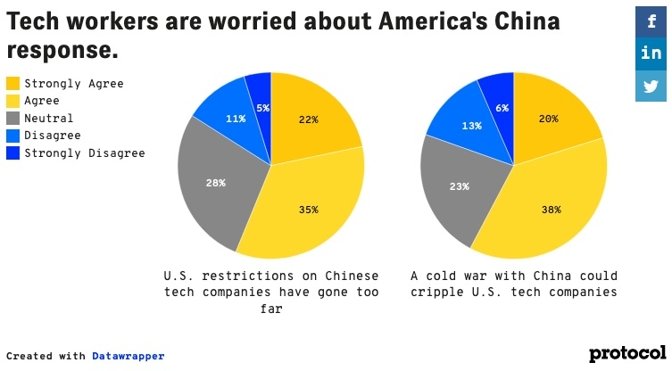Majority of tech staffers say Big Tech wields too much power in new survey
Workers inside Apple, Amazon, Alphabet, Facebook and others are starting to express that they believe that tech giants wield too much cultural and economic power.

Credit: WikiMedia Commons
Amid increased scrutiny of the technology industry from consumers and various governments, Protocol
carried out a survey of about 1,504 tech company employees. The outlet asked a variety of questions, from issues with China or whether Big Tech should be broken up.
When asked whether Apple, Amazon, Facebook, and Alphabet have too much power, 77% of respondents answered yes and only 8% disagreed. Protocol asked the same question about the industry as a whole, and found similar results with 78% agreeing or strongly agreeing.

Credit: Protocol
In a related line of questioning, about 40% of respondents said that technology does more harm than good. Just over 40% also said they believed that Facebook, Amazon, Alphabet, and Apple should be broken up.
A majority of those surveyed also said they want Section 230 reform, though the answers weren't so black and white. Only 62% of respondents said they knew what Section 230, but three quarters of those people said the law should be reformed.

Credit: Protocol
However, most believe that the core principles of Section 230 protections should remain the same, with 65% agreeing with the statement that "tech companies should not be held liable for the content on their sites and products." A whopping 82% of respondents also realize that Section 230 could have an impact on "more than just big tech companies."
On China, 56% of the tech employees say that U.S. restrictions on Chinese technology firms have gone too far. 60% of those respondents also added that U.S. companies should work more closely with China-based counterparts.

Credit: Protocol
However, 46% said that they agreed with the statement that Huawei should be banned from the U.S., and 58% said that a cold war with China would "cripple U.S. tech companies."
A majority of respondents also want regulation for artificial intelligence, with 73% agreeing that it's time for the government to step in. On a separate note, 44% of those surveyed said that Big Tech should stop working with law enforcement entities. A smaller portion, 34%, disagreed with that answer.
Protocol's survey asked questions of 1,504 employees across the U.S. The publication notes that those staffers ranged from "C-suite level executives to associates." Nearly 40% are from large technology companies with more than 1,000 employees and annual revenues eclipsing $500 million.

Credit: WikiMedia Commons
Amid increased scrutiny of the technology industry from consumers and various governments, Protocol
carried out a survey of about 1,504 tech company employees. The outlet asked a variety of questions, from issues with China or whether Big Tech should be broken up.
When asked whether Apple, Amazon, Facebook, and Alphabet have too much power, 77% of respondents answered yes and only 8% disagreed. Protocol asked the same question about the industry as a whole, and found similar results with 78% agreeing or strongly agreeing.

Credit: Protocol
In a related line of questioning, about 40% of respondents said that technology does more harm than good. Just over 40% also said they believed that Facebook, Amazon, Alphabet, and Apple should be broken up.
A majority of those surveyed also said they want Section 230 reform, though the answers weren't so black and white. Only 62% of respondents said they knew what Section 230, but three quarters of those people said the law should be reformed.

Credit: Protocol
However, most believe that the core principles of Section 230 protections should remain the same, with 65% agreeing with the statement that "tech companies should not be held liable for the content on their sites and products." A whopping 82% of respondents also realize that Section 230 could have an impact on "more than just big tech companies."
On China, 56% of the tech employees say that U.S. restrictions on Chinese technology firms have gone too far. 60% of those respondents also added that U.S. companies should work more closely with China-based counterparts.

Credit: Protocol
However, 46% said that they agreed with the statement that Huawei should be banned from the U.S., and 58% said that a cold war with China would "cripple U.S. tech companies."
A majority of respondents also want regulation for artificial intelligence, with 73% agreeing that it's time for the government to step in. On a separate note, 44% of those surveyed said that Big Tech should stop working with law enforcement entities. A smaller portion, 34%, disagreed with that answer.
Protocol's survey asked questions of 1,504 employees across the U.S. The publication notes that those staffers ranged from "C-suite level executives to associates." Nearly 40% are from large technology companies with more than 1,000 employees and annual revenues eclipsing $500 million.

Comments
Truly, the road to hell is paved with good intentions.
Unfortunately unless management feels the same way as their employees, or consumers stop doing business with them, "too much power" ( a very nebulous term, by the way) won't get fixed. That's unfortunately because people like free or cheap stuff. Until we all as a society realize what the real cost of how these services are being delivered by these companies is and decide that it's not what we want, companies like those aforementioned will continue to thrive.
Maybe if "government" had not allowed some of these big tech mergers to occur, they wouldn't have to go back and fix the problems they've caused. I think it's way overdue for the GDPR like legislation here in the USA (and take it a step further in that all sharing of PII must be opt out by default).
Hmmm.. "which of these 'Big Tech' companies is not like the others" = Apple, Facebook, Google and Amazon.
Apple is largely a hardware company with service on the side. The only influential product is Apple News. I don’t think Apple Music or Apple TV can have much influence on the culture or society. Not to mention there are many other choices available in the same field.
Apple is not a even media company, unlike ABC, Facebook, News Group. Even Amazon has more influential power than Apple.
Or was it? For are you not the least bit curious as to why they didn’t do the same to Facebook, which was the primary host of those who planned the Capitol Hill riots?
The root of my concern with regard to “breaking up big tech” is that platforms like the App Store, Amazon, Facebook, Twitter, etc., are being viewed as monopolistic because of their success and extremely high levels of consumer adoption and not because the platform owners actively or unfairly blocked competitors from entering the market. Too often the potential competitors gave up and ceded control to the market leader. Facebook could develop its own devices, host its own applications on its own servers, run its own App Store, and compete head to head against Apple and/or Amazon. They chose not to control their own destiny, but to ride on top of someone else’s work. Now they’re less than happy about their dependence on things they decided to give up.
My take on the consumer side is that Facebook, Parler, Fox News, disgruntled politicians, etc., may have provided a megaphone for spreading lies and inciting violence, but it is the consumers who actively chose to slurp up the misinformation and take up arms and commit violence against their own country and fellow citizens. That was a choice, not people following orders of anyone with power over them. I cannot imagine what they thought was in it for themselves.
But you are correct in alluding to the fact that Apple, Google, and Amazon attempting to shut down the megaphone, at least temporarily, doesn’t solve the root cause of the problem, and I agree, it wasn’t applied equitably. I guess we have much bigger problems to solve than anything having to do with big tech.